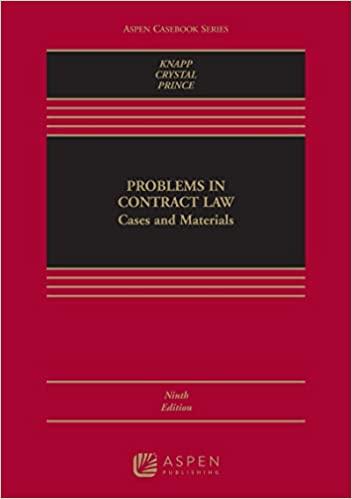Question
What federal court considers appeals from federal administrative agencies? U.S. Court of Claims U.S. Supreme Court U.S. Court of Federal Appeals U.S. Court of Appeals
What federal court considers appeals from federal administrative agencies? U.S. Court of Claims
U.S. Supreme Court
U.S. Court of Federal Appeals
U.S. Court of Appeals for the Federal Circuit
What is a binding arbitration clause? A clause in a contract that is unenforceable because it is viewed by courts as unconscionable
A clause in a contract that requires that arbitrators who resolve disputes arising under the contract to be selected from the American Arbitration Association
A clause in a contract that provides that the parties are bound to perform their obligations under the contract whether ordered by an arbitrator or not
A clause in a contract that provides that disputes that arise under the contract will be resolved through arbitration and that the decision by the arbitrator will be binding and must be accepted by both parties to the contract
The trial courts in the federal court system (i.e., the U.S. district courts) are courts of general jurisdiction, which means the courts have the: authority to consider a wide range of cases and to grant almost any legal or ethical remedy.
power to consider any case that is assigned to them by an intermediate appellate court.
power to consider any civil case but no criminal cases.
authority to make final decisions in cases that cannot be reviewed by other courts.
All states have a court of last resort in their state court system, often called the Supreme Court, but approximately half the states: call that court the Court of Final Appeals.
do not allow that court to consider cases involving state officials.
do not have an intermediate appellate court between the trial court and the Supreme Court.
allow the U.S. Supreme Court to overrule the court of last resort in the state.
What is the form of alternative dispute resolution that does not involve a neutral third party and that allows the parties to the dispute to maintain a high level of autonomy?
Negotiation
Arbitration
Mediation
Med-arb
- Question 6
- What is the common law?
- The laws involving the rights and responsibilities in the relationships between private persons and private business organizations
- State laws that apply to all citizens of the state
- Laws that involve disputes between private individuals
- The collection of legal interpretations of laws made by judges in the cases that they decide
Step by Step Solution
There are 3 Steps involved in it
Step: 1

Get Instant Access to Expert-Tailored Solutions
See step-by-step solutions with expert insights and AI powered tools for academic success
Step: 2

Step: 3

Ace Your Homework with AI
Get the answers you need in no time with our AI-driven, step-by-step assistance
Get Started


